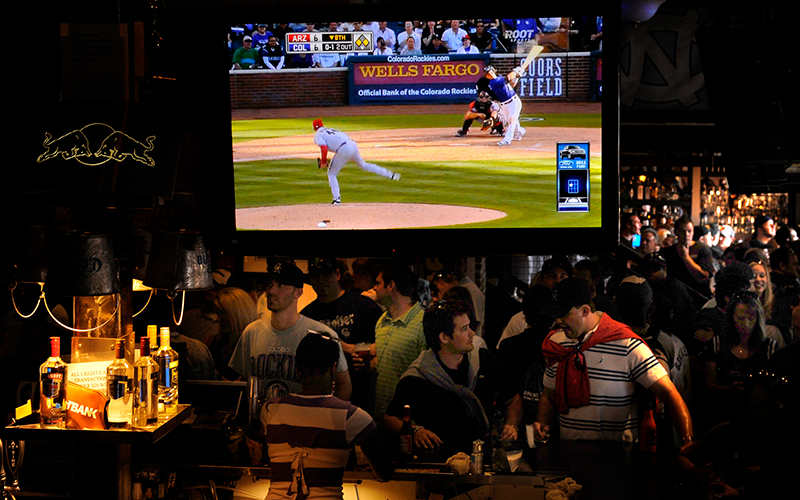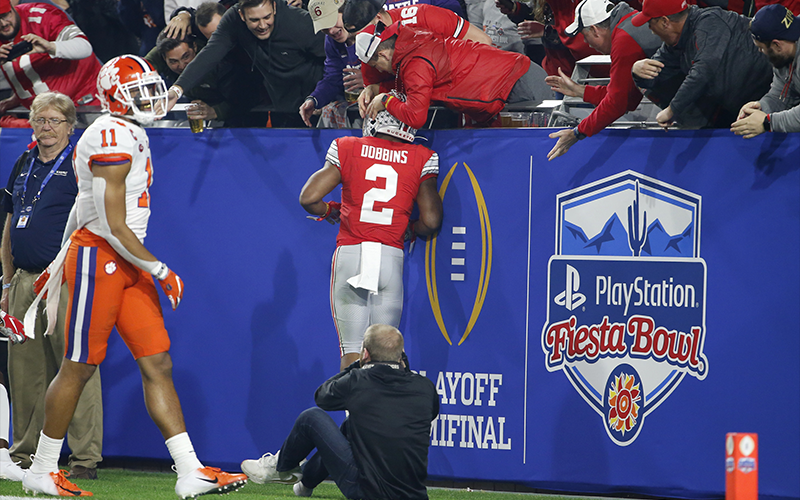PHOENIX – Watching sports has always been one of America’s favorite pastimes. When the COVID-19 pandemic forced games and leagues to temporarily shutter, the country seemed to collectively ache.
So when live sports finally returned in a rush, fans should have been ecstatic. But the plummeting television ratings tell a different story.
“After three months of no sports whatsoever, the NBA, MLB and NHL all turned the taps back on at the same time, and for the fan, it was like being asked to drink out of a firehose,” said Anthony Crupi, Sportico sports media reporter.
Different demographic groups pinpoint various reasons for fans’ lowered interest and viewership, according to a new study by the Marist Poll and the Center for Sports Communication at Marist College. About 46% of self-described sports fanatics say they have spent less time watching sports than in the past, the poll reported.
“I think there are several reasons for smaller ratings. A big one is how COVID-19 has affected every aspect of our lives, sports among them,” said Bill Goodykoontz, media critic for the Arizona Republic and AZCentral.
“When you’re watching the NBA Finals in October, that’s weird. The Masters in November? Really weird. And of course there weren’t any games of any kind for a while. Everything is off a little — not just with games, of course, but with everything.”
The NBA Finals on ABC averaged about 7.5 million viewers this year, the lowest-rated Finals since 1988 according to Sports Business Daily. Weeks after the Los Angeles Lakers captured the NBA championship, the Los Angeles Dodgers won their first World Series title in 32 years, but viewership was still at an all-time low during the Fall Classic’s six games, according to Nielsen Media Research provided to Sportico.
Why were the ratings so low, especially during a time when many sports fans are still staying close to home – and, presumably, near their TVs or smart devices?
While it was the first time in history that the Finals aired at the same time as the MLB playoffs, one survey suggested some viewers were not in favor of athletes and leagues taking stands about social justice and becoming vocal supporters for causes and current events.
In the Marist Poll survey, 70% of Republicans said they were less likely to watch live sports, while 61% of Democrats said athletes speaking out about social justice issues was not a factor in whether they watched a game.
“I don’t buy the argument that it’s a political thing. I mean, everyone probably has an anecdotal example of some friend or relative who says they won’t watch the NFL because players might kneel. But I think it’s the combination of other factors that have had a much bigger effect,” Goodykoontz said.
Goodykoontz, like many others, said he enjoyed watching the NBA’s social justice efforts, and believes the drop in sports ratings is due to the fact that something greater is happening in our society affecting every single one of us.
“I also think you can’t discount the fact that a lot of people are concerned with more important things right now,” he said. “I love watching sports but there is so much going on in everyone’s lives right now that it’s understandable if people don’t have the time or the interest, that they’re overwhelmed with real life.”
In fact, one out of every third sports fan according to the Marist Poll reported watching less sports due to their concern pertaining to the coronavirus, while one in five said they would rather watch coverage of the 2020 election.
In addition, the games look different with stadiums and ballparks either mostly empty or partially filled with fans – far from a normal year.
“Fans have had more of an effect on the viewing experience than I would have guessed,” Goodykoontz said. “It enhances the feeling that it’s just not normal.”
The coronavirus has impacted viewership in another way. The shared experience.
“One of my great joys watching sports is to be screaming and cheering with my friends, in my living room or at a sports bar,” said Chris Franklin, 31, a food industry worker from Scottsdale. “(Viewing) alone kind of ruins the experience.”
Ratings for live sporting events aren’t the same as ratings for scripted TV shows. Even though viewership dropped for the World Series, the baseball season is in no danger of being canceled.
“While it’s understandable for people who are particularly enthusiastic about a given drama or comedy series may keep an eye on the weekly ratings, in the same way some political junkies can’t help but look at the polls every couple of hours,” Crupi said.
“Unless you’re in the business, there’s really no reason to pay attention to any of that stuff, but somewhere along the line, it became its own weird little spectator sport.”


